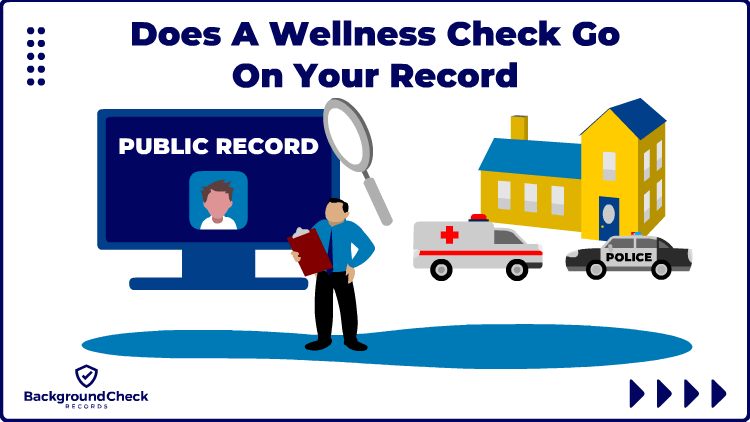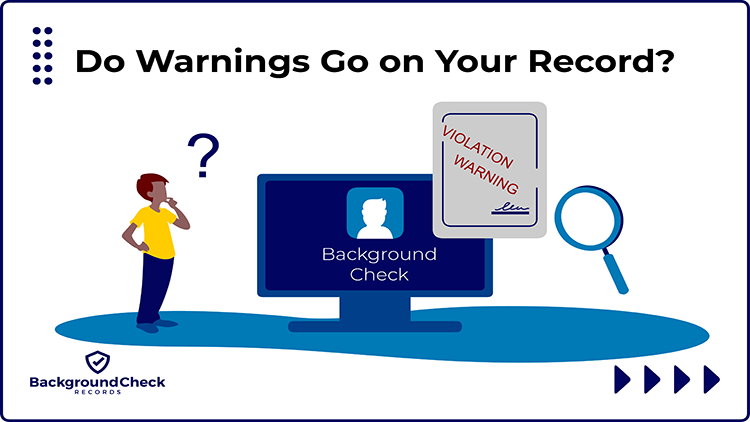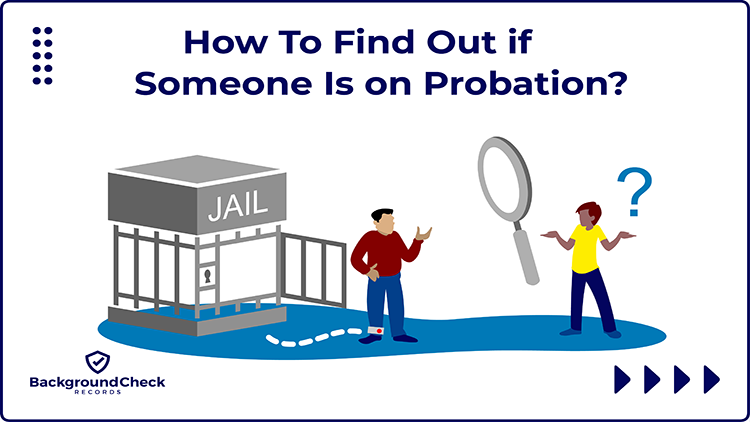Does a Wellness Check Go on Your Record? Welfare Check?
One might wonder if a wellness check or a welfare check is recorded, and whether there is a distinction between the two.
Interested parties can run a public record search on themselves or loved ones to see if the wellness check shows and to be sure future employment and housing prospects won’t be affected.
After checking, it’s a good idea to get familiar with your rights, state laws, what shows on a wellness check, at what point wellness checks become harassment and ways to stop them if you or someone is alive and well.
Wellness Checks Definition & Explanation
Simply put, a wellness check is when the local law enforcement agency sends one or more officers to check on a person and make sure they are okay. The reason for a wellness check varies depending on the person requesting the wellness check and the circumstances surrounding the request.
Wellness and welfare checks are conducted by local law enforcement who are tasked with making contact with the person in question and determining if the individual is in need of assistance either from medical professionals or further law enforcement intervention.
For example, an elderly person may have fallen or had a health emergency that requires EMS to transport them to the nearest hospital. A person struggling with drug or alcohol addiction may need detox and treatment, whereas a victim of domestic violence may need law enforcement to transport them to the nearest shelter.
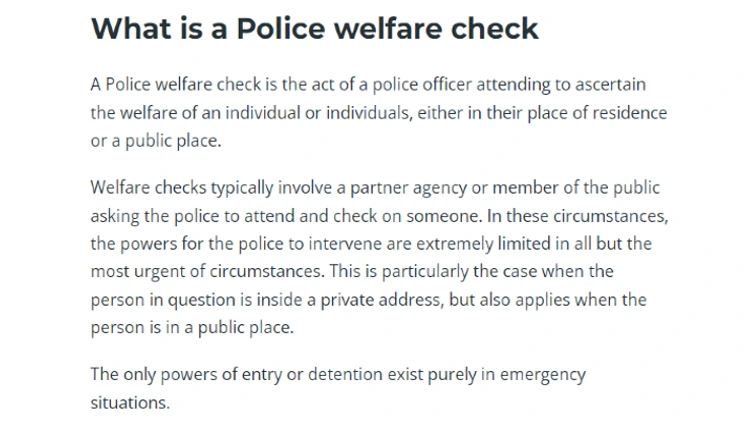
Each call can be vastly different, even if it is a wellness check on someone law enforcement has checked on before.
Wellness Check vs Welfare Check
Sometimes the terms wellness check and welfare check are used interchangeably. Both terms describe the same action by law enforcement responding to an address to make sure the person living there is not in any danger. Wellness checks can also be conducted when law enforcement notices a vehicle in the same spot, such as at a park or parking lot, for a long time without the occupants existing the vehicle.1
There are many reasons a welfare check can be conducted, and law enforcement follows certain protocols when performing one.
Reasons and Justifications for Welfare Checks
Individuals can call law enforcement and request a welfare check on someone for many reasons. These include:
- A friend or family member who makes regular contact suddenly stops calling, and does not answer their phone.
- A friend struggles with suicidal ideation, and the person cannot be reached over the phone, does not answer the door, and doesn’t respond to inquiries over social media.
- A neighbor who hasn’t been seen in a few days and doesn’t answer knocks at the door. The neighbor didn’t mention going out of town.
- An employee doesn’t show up for work and doesn’t call in sick. This behavior is highly unusual.2
These are just a few of the reasons welfare checks can be conducted on adults, however, law enforcement is also called at times to conduct a welfare check on a child. Welfare checks on children are conducted when a person calls to report they believe a child is being abused or neglected, or the child is believed to be a runaway or abandoned.
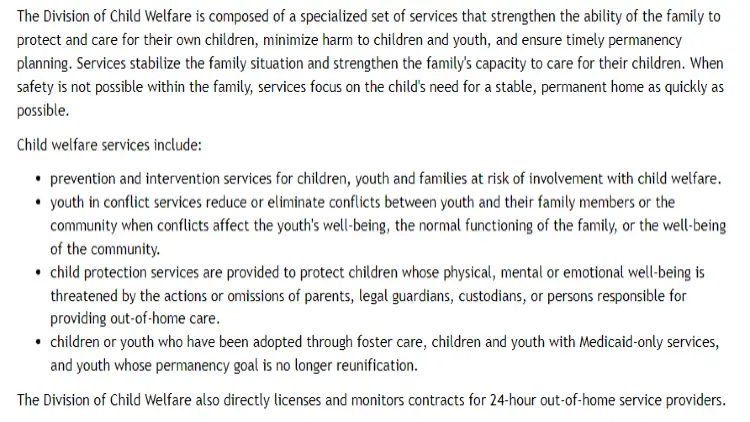
A welfare check is more than just stopping by and putting eyes on the individual in question. Law enforcement must follow a process when conducting a wellness check.
What Is Included in a Wellness Checkup? Understanding the Contents of a Police Wellness Check on a Child
The first step in a wellness check on a child or adult is a call from a concerned individual requesting a law enforcement check on the wellbeing of another. When making the call to 911 or dispatch, the person should provide the following information:
- Name of the person believed to be injured or in danger
- Address of the individual to be checked
- Age of the person. This is vital since welfare checks on adults and wellness checks on children are different.
- Reason for the request. This can include suddenly losing contact with an elderly family member, knowing someone is struggling with substance abuse or suicidal ideation, or seeing a child that appears abandoned or abused.
- Name and contact number of person making request if they are not making an anonymous welfare check request. Most individuals will provide their contact information because they want to be informed the person is okay; however, there are some circumstances where an anonymous request is made such as checking on someone believed to be a victim of domestic violence.
- Any additional information that will be important to the officer or officers responding to the call such as entrance ways into the residence, whether there are weapons at the home, if the individual has pets (dogs or cats), and other potential hazards to the officers.
Dispatch will send the information to the officer or officers that cover that part of the town or county to conduct a wellness check and pass all the information provided by the caller to them.
Law enforcement will respond to the home to attempt contact with the individual, but the question of whether they can enter the home without the homeowner’s permission arises. Generally, law enforcement can enter into a person’s home to conduct a welfare check when the officer has weighed exigent circumstances (such as imminent danger to occupant), and circumstance totality.3
The Fourth Amendment of the United States Constitution prohibits law enforcement from illegally searching a person’s home unless exigent circumstances lead law enforcement to believe the occupant or occupants are in imminent danger.4 Generally, police wellness checks fall under this definition of exigent circumstances.5
Section 1983 of the Civil Rights Act protects law enforcement from potential lawsuits when they enter a home based on a wellness check. This is known as qualified immunity and argues that the potential risk of not taking action would be greater than the potential harm of entering the residence.6
Law enforcement will make attempts to speak to the person potentially in danger or need of medical attention. If they find the person is okay and not in any danger, law enforcement will report back that contact was made, the person is okay and will be reaching out to family or friends. One might inquire whether a wellness check is recorded when law enforcement visits your home. It doesn’t go on a person’s public record but can be on file at the police department, and the family member or friend may disclose they requested a check on you.
When law enforcement finds that the person is injured, has overdosed or deceased, they will contact the proper emergency personnel to transport the person to the nearest medical facility for those who are not deceased, or they will reach out to the local mobile crisis support team through the mental health agency in that area. The mobile crisis team will respond and make a determination if law enforcement should transport the individual to the nearest hospital for evaluation and possible commitment.
The US Substance Abuse and Mental Health Services Administration (SAMHSA) provides guidance to law enforcement and mental health agencies on dealing with crises that arise out of wellness checks.7
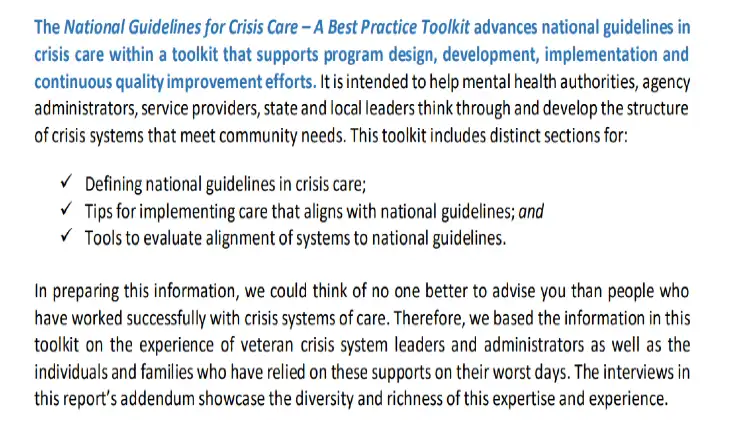
The FBI has also provided guidance to law enforcement on responding to mental health calls to help prevent escalation.8
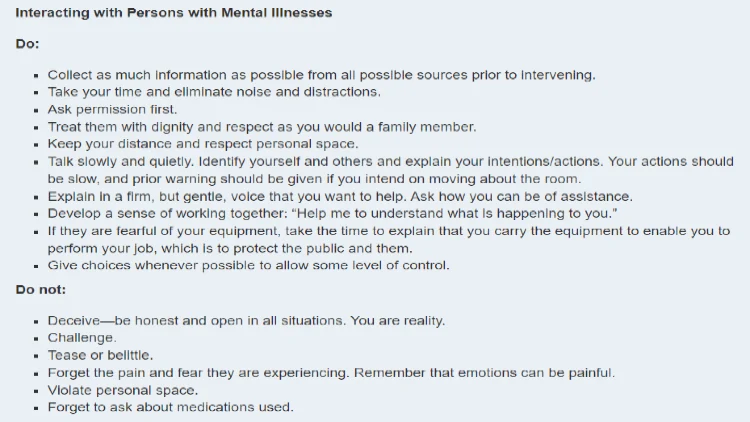
When law enforcement finds a person is deceased, paramedics still respond to the scene and make the determination the county coroner needs to be consulted. The coroner then determines if the body is to be transported to the local morgue or a funeral home.
Wellness checks on minor children include law enforcement speaking to a child (when the child is old enough to speak) and the custodian to determine if there is a possible danger to the child. The interaction also relies very heavily on the information provided by the person or agency requesting the welfare check such as the resident’s name here, what the nature of the complaint is, and what outcome they would like to see.
For example, social services in an area can request law enforcement check on children in a home based on a report of possible abuse or neglect, or in cases where social services have been denied entry into a home by the occupants. In these cases, social services should provide as much information as possible to assist law enforcement in making the best decisions on entry into the home.
One might wonder if a wellness check is recorded when social services initiate it. If charges are filed pursuant to the social services check, the charges can go on a person’s record, and the wellness check may become part of the testimony in court. Since these records involve minors, the matters are sealed from public view.
Procedures for child welfare checks vary from state to state and are outlined in state child welfare statutes. The table below lists the statute for each state regarding child welfare checks.
| State |
Child Welfare Statute |
| Alabama |
Title 12, Chapter 15 |
| Alaska |
AS 47:10 |
| Arizona |
Title 8, Chapter 4 |
| Arkansas |
Title 9, Subchapter 2, Chapter 15 |
| California |
Family Code, Division 12, Part 3 |
| Colorado |
Title 19, Article 3 |
| Connecticut |
Title 17a, Chapter 319 |
| Delaware |
Title 31, Chapter 3 |
| Florida |
Title V, Chapter 39 |
| Georgia |
Title 15, Chapter 11 |
| Hawaii |
Title 20, Chapter 350 |
| Idaho |
Title 16, Chapter 16 |
| Illinois |
Chapter 20 ILCS 505 |
| Indiana |
Title 31, Article 24 |
| Iowa |
Title VI, Chapter 235 |
| Kansas |
Chapter 38, Article 22 |
| Kentucky |
Title LI, Chapter 620 |
| Louisiana |
Children’s Code, Title 5, CHC 308 |
| Maine |
Title 22, Chapter 1071 |
| Maryland |
Family Law, Title 5 |
| Massachusetts |
Part 1, Title XVII, Chapter 119 |
| Michigan |
Section 712A.13a |
| Minnesota |
Chapter 260C |
| Mississippi |
Title 43, Chapter 15 |
| Missouri |
Title 12, Chapter 210 |
| Montana |
Title 40, Chapter 6 |
| Nebraska |
Chapter 43 |
| Nevada |
Title 38 |
| New Hampshire |
Title XII, Section 169C |
| New Jersey |
Title 3 |
| New Mexico |
Chapter 32A |
| New York |
Article 6, Title 3 |
| North Carolina |
Chapter 7B |
| North Dakota |
Title 14, Chapter 14 |
| Ohio |
Title XXI, Chapter 2151 |
| Oklahoma |
Article 10A, Chapter 1 |
| Oregon |
Title 34, Chapter 418 |
| Pennsylvania |
Title 23, Part VI |
| Rhode Island |
Title 15, Chapter 7 |
| South Carolina |
Title 63, Chapter 7 |
| South Dakota |
Title 26, Chapter 4 |
| Tennessee |
Title 36, Chapter 1 |
| Texas |
Family Code, Title 5, Chapter 262 |
| Utah |
Title 80, Chapter 2 |
| Vermont |
Title 33, Chapter 49 |
| Virginia |
Title 63.2 |
| Washington |
Title 13, Chapter 13.34 |
| West Virginia |
Chapter 49 |
| Wisconsin |
Chapter 48, Subchapter IV |
| Wyoming |
Title 14 |
Law enforcement logs all wellness check calls including the date and time of the call, who they speak with and the outcome of the call for future reference. These records are maintained by the police department.
Do Wellness Checks and Welfare Checks Appear on Your Record?
After completing a wellness check, law enforcement files a report, which is kept on record by the agency. Whether a wellness check appears on a person’s record is complex; typically, welfare checks do not become part of someone’s public record unless they lead to a criminal investigation.
When police conduct a welfare check and discover a criminal act in the course of the check, the criminal act can result in charges which become public record. The reason law enforcement was involved with the person initially (the welfare check) may be noted in the police report, but will not show up on a background check.
If the person is in a mental health crisis or substance abuse overdose, police will note the information in the police report; however, disclosure to the public of the reason for the call will not be available; however, the responding officer can disclose to the person who requested the check if the individual is safe.
Health Insurance Portability and Accountability Act (HIPPA) laws that prohibit disclosing medical information only apply to law enforcement when the officers are requesting information from a medical professional.
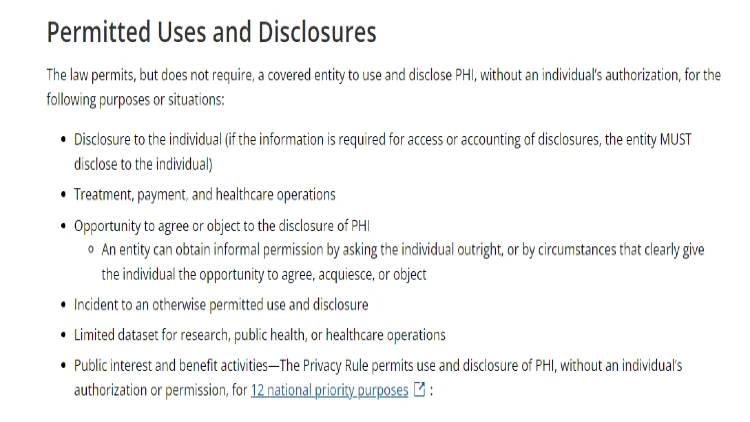
HIPPA does prohibit medical professionals from disclosing a person was admitted pursuant to a welfare check.9
Is a Wellness Check Recorded in Your Public Record?
Some may wonder if a wellness check becomes part of your public record. Typically, a wellness check will not show up on a public search because it is generally not considered a public record but if a criminal investigation transpires from it, then the investigation may be. It is only when a criminal charge stems from the wellness check that any public record will be generated. In this case, the public record is the pending criminal charge, not the welfare check.
For example, if someone requests a welfare check on a person known to abuse drugs, and, in the course of the welfare check law enforcement sees illegal substances in plain site and takes the person into custody, the public record will show a drug charge, not that family or friends requested a check.
While court transcripts can include testimony from law enforcement about why they responded to the home where charges were subsequently filed, most background checks will just show the charge or conviction, not testimony offered.
Police Records of Wellness Checks
Police maintain records of wellness checks in order to provide information in the event they are called to the same location at a later date. For example, there is a report a person may be a victim of domestic violence and a welfare check is requested but the individual reports they are okay and not a victim, law enforcement will note this. If, weeks later, another wellness check request comes in for the same person and address, law enforcement responding will be alerted there is a history at this particular address.
One might wonder if police reports appear on background checks following a wellness check. Typically, police reports of any type will not show up on background checks, and there are protections for those who are subject to a welfare check.
Wellness Checks and Background Reports
One of the most pressing questions a person has when they are subject to a wellness check is the potential impact of the information on them. They want to make sure the information doesn’t show up on background checks or other reports and is used against them. Fortunately, there are laws like HIPPA that help protect their rights and information from public disclosure.
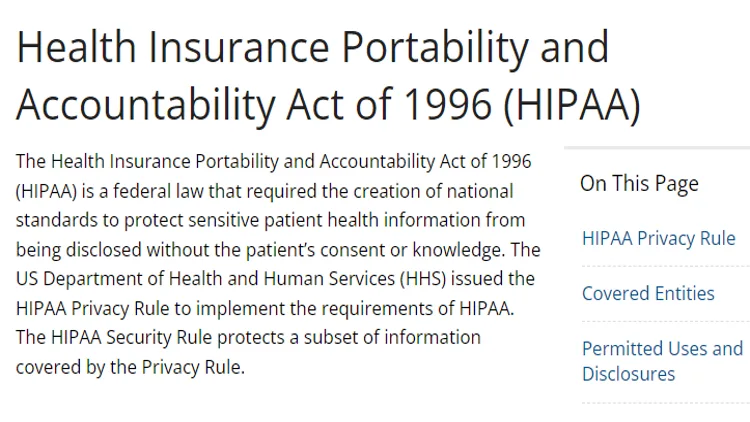
HIPPA protects medical information from being released by hospitals, doctors, or other medical professionals, including mental health workers and substance abuse counselors. Under HIPPA guidance, sensitive medical information about the individual, including involuntary commitments, cannot be disclosed without the patient’s informed consent.
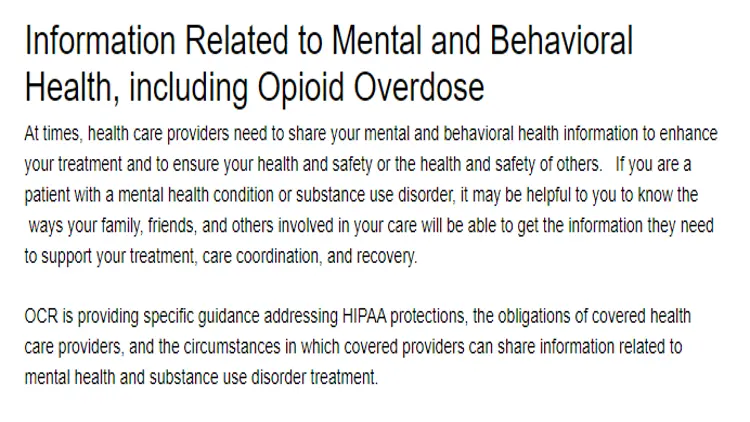
The Americans With Disabilities Act strictly prohibits discriminating against someone based on a medical or mental health diagnosis. This prevents employers and landlords from refusing to hire or rent to a person simply because someone requested a welfare check for medical or mental health reasons. It also helps protect a worker from discriminatory practices when an employer calls in a wellness check on an employee who may be sick or suffering a mental health crisis.
Does Mental Illness Detected During a Welfare Check Appear on a Background Check?
Because mental illness is considered part of a person’s medical history, disclosure of mental illness on a background check is prohibited. Mental illness may be indicated if a person’s record shows they were ordered to attend an abuser treatment program or substance abuse education and treatment program.
However, most routine background checks only show if the person was convicted of a crime, not details of sentencing. Therefore, even if you know ways to determine whether someone is currently in police custody, it will not reveal a person who was taken into custody for a mental health emergency.
Does Admission to a Mental Hospital Appear on a Background Check?
Mental hospital inpatient or outpatient treatment is a medical record and is not subject to disclosure on any background checks. Each state has wording in its laws surrounding involuntary commitment that protects the rights and information of the person being placed in a secured treatment facility.
The table below lists the laws in each state regarding involuntary commitment of persons who are mentally ill, a danger of harm to self or others, and are deemed unable to make rational decisions for their continued care and safety without intervention.
Even in the event a person was involuntarily committed due to mental health or detox reasons, the information will not show up on a background check. Additionally, court hearings for involuntary commitments are civil cases heard in closed sessions and not open to the public.
When a person is concerned about a friend who may be in danger of self harm or harm to others, they can contact law enforcement and request a wellness check anonymously. The person requesting the check is not obligated to provide their name or contact information to law enforcement when they call in the complaint.
Additionally, a number of state social service agencies allow individuals to make anonymous reports of child abuse, neglect or dependency online or by calling a hotline number; however, this is for family members and friends making the report. Mandatory reporters, such as teachers or medical professionals, are required to provide their name as part of the investigatory process.
Individuals can also call or text the Childhelp National Child Abuse Hotline at 1-800-422-4453 to make a report, or they can chat online with a trained professional that will submit the report to local law enforcement where the report is generated for a wellness check on the child.
Your Rights & Laws When it Comes to Wellness And Welfare Checks
Wellness or welfare checks are a great way to make sure a family member, friend or child is not in danger, but there are laws in place that protect individuals. In most cases, a person can refuse a wellness check by simply stepping outside and speaking with law enforcement long enough to assure they are fine.
The Fourth Amendment shields persons from unlawful search and seizure, so if a person establishes there is no danger without law enforcement from entering the home, police cannot force their way in.4
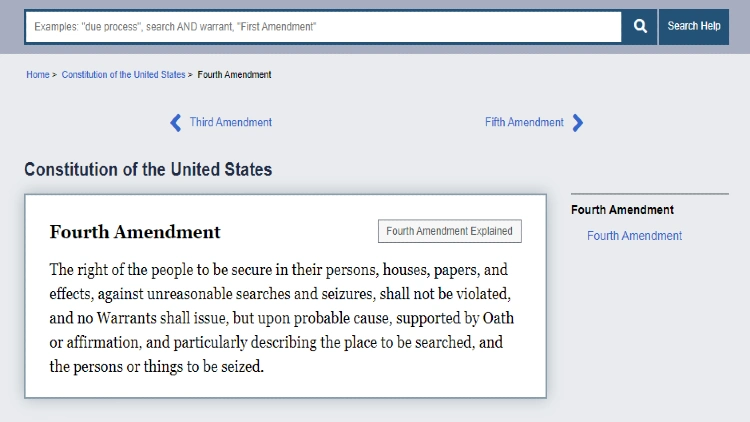
In cases where law enforcement has reason to believe someone in the household may be in danger, the officer or officers can enter the home to check on the welfare of that inside. This is often the case involving children or when someone calls in a request for a welfare check on a person believed to be the victim of domestic violence.
One might wonder if a wellness check is recorded on their record. It typically is not, and if it erroneously appears, one can file a complaint with the attorney general’s office in the relevant state.
Additionally, if the record is used unlawfully, the individual can take action against the entity that disclosed and used the record. For example, if a mental health wellness check is used to deny employment, the person can report the unlawful practice to the Equal Employment Opportunity Commission.
When Police Welfare Checks Become Harassment & What You Can Do About It (Police Welfare or Welfare Check Harassment)
While police welfare checks can help people know family and friends are okay, the process can be abused as well. Police welfare checks can become harassment when an individual is using police to check on a victim of domestic violence who has left the person making the request.
Abusers will sometimes use a wellness check as a way of trying to maintain control over a victim.
When this happens, the victim can request law enforcement not disclose information to the person who requested the report. Law enforcement is under no obligation to let the person requesting the wellness check know the outcome. Additionally, police can speak with the local district attorney’s office to see if this type of misuse of the welfare check system is a chargeable offense such as violation of a restraining order.
Some police have also used wellness checks as a means to get around getting a search warrant to see if a home has illegal drugs or weapons inside. Police welfare or welfare check harassment is a violation of a person’s civil rights and violates best practices for law enforcement.
When someone feels police have abused the welfare check process to illegally search their home, they can contact an attorney to not only have any evidence seized declared unfit to present in court, the attorney can also advise on any legal action that can be taken for a violation of the person’s constitutional rights.
How To Prevent Wellness Checks
There are a number of reasons why someone would not want a welfare check. As stated earlier, one of the more common reasons someone may wish to not have a welfare check is for safety concerns after leaving an abusive relationship.
A person has the right to request law enforcement not conduct future wellness checks at their property.
Establishing there is no imminent threat to self or others at the initial wellness check can help prevent future ones. If wellness checks continue after a person has requested they stop, the individual can reach out to the attorney general’s office in their state to make a formal harassment complaint.
Wellness checks can offer peace of mind when contacting a family member or friend is challenging, with police providing support and services and keeping a confidential record of the service call. However, these records are not public, so it’s accurate to say that wellness checks typically do not appear on a person’s record.
Frequently Asked Questions
When Do Wellness Checks Go On Your Record?
Wellness checks may be on record at the police department, or as part of a civil hearing for involuntary commitment, but they will not appear on a public record. Wellness checks involving abuse, neglect or dependency of a minor are considered closed or sealed records only available to law enforcement and court personnel with a need to know.
Can One Decline a Wellness Check?
It is possible to refuse a wellness check; however, if law enforcement believes there is an imminent danger to someone in the home, police are authorized to enter without a search warrant to make sure someone is safe and unharmed.
Are Wellness Checks Part of the Public Record?
Since wellness checks typically involve medical or mental health matters, they are confidential and are not considered public record. Involuntary commitments or other treatments that arise out of the wellness check are protected by HIPPA laws regarding sensitive medical records.
1 Guide, S. (n.d.). WHAT IS THE DIFFERENCE BETWEEN AN “INVESTIGATORY STOP” AND A “WELFARE CHECK”? Roth Davies LLC. Retrieved October 24, 2022, from <https://www.rothdavies.com/criminal-defense/frequently-asked-questions-about-criminal-defense/what-is-the-difference-between-an-investigatory-stop-and-a-welfare-check/>
2 Guide, S. (n.d.). What Is a Police Welfare Check? | The Law Dictionary. Black’s Law Dictionary. Retrieved October 24, 2022, from <https://thelawdictionary.org/article/what-is-a-police-welfare-check/>
3 Welfare Check Purpose & Laws | What is a Welfare Check? – Video & Lesson Transcript. (2022, March 11). Study.com. Retrieved October 24, 2022, from <https://study.com/learn/lesson/welfare-check-purpose-laws.html>
4 U.S. Constitution – Fourth Amendment | Resources | Constitution Annotated | Congress.gov | Library of Congress. (n.d.). Constitution Annotated. Retrieved October 24, 2022, from <https://constitution.congress.gov/constitution/amendment-4/>
5 The Role of Law Enforcement in Child Welfare Checks | Torrance Personal Injury and Sexual Abuse Lawyer | Los Angeles Metro Area. (n.d.). Booth Law. Retrieved October 24, 2022, from <https://booth.law/the-role-of-law-enforcement-in-child-welfare-checks/>
6 Page 3951 TITLE 42—THE PUBLIC HEALTH AND WELFARE § 1983 § 1983. Civil action for deprivation of rights Every person who, und. (n.d.). GovInfo. Retrieved October 24, 2022, from <https://www.govinfo.gov/content/pkg/USCODE-2009-title42/pdf/USCODE-2009-title42-chap21-subchapI-sec1983.pdf>
7 National Guidelines for Behavioral Health Crisis Care Best Practice Toolkit. (2020, February 24). SAMHSA. Retrieved October 24, 2022, from <https://www.samhsa.gov/sites/default/files/national-guidelines-for-behavioral-health-crisis-care-02242020.pdf>
8 Mason, C., Burke, T. W., & Owen, S. S. (2014, February 4). Responding to Persons with Mental Illness: Can Screening Checklists Aid Law Enforcement? | FBI: Law Enforcement Bulletin. FBI Law Enforcement Bulletin. Retrieved October 24, 2022, from <https://leb.fbi.gov/articles/featured-articles/responding-to-persons-with-mental-illness-can-screening-checklists-aid-law-enforcement>
9 Stanger, K. (2017, September 26). Police, Providers, Patients and HIPAA. Holland & Hart LLP. Retrieved October 24, 2022, from <https://www.hollandhart.com/police-providers-patients-and-hipaa>

